How to Start an LLC in 2022? 7 Steps You Must Follow
How to Start an LLC in 2022? 7 Steps You Must Follow
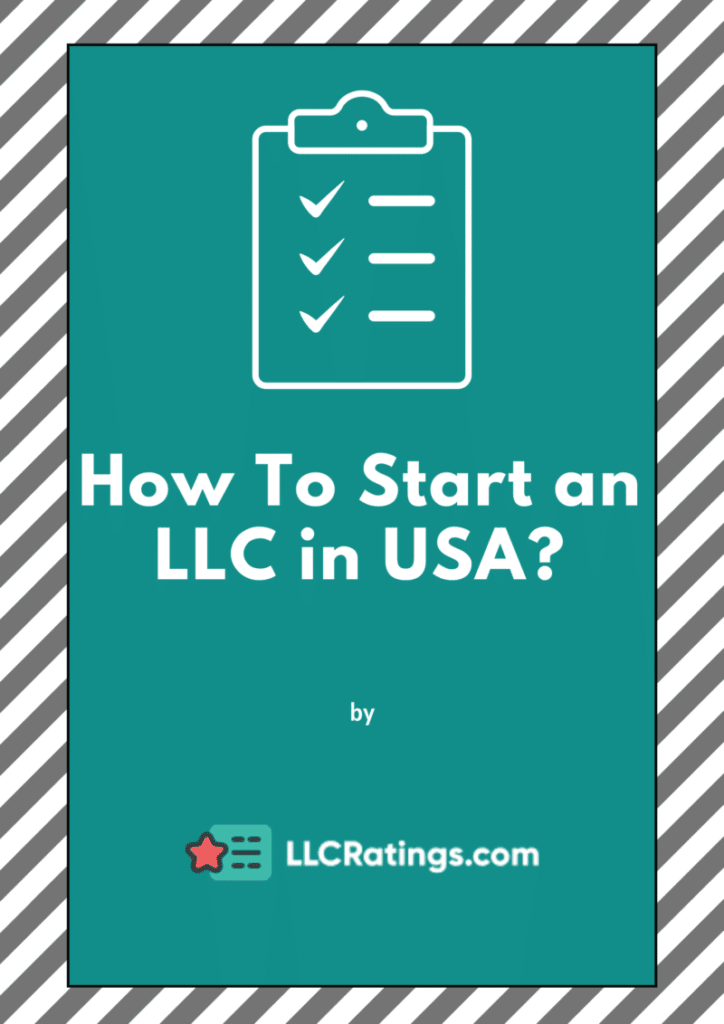
Every year, over 600,000 new businesses start in the U.S. According to NSBA’s 2018 report, most small businesses are LLCs (35%+). Are you wondering why a limited liability company is famous for startups and small businesses? Simple: It offers management flexibility, provides liability protection, and promises less paperwork.
The best part? You don’t have thousands to create an LLC! But that doesn’t mean creating an LLC is 100% easy. There are unique challenges, pros and cons, and steps you need to consider before you get started.
Hire Northwest Registered Agent today, and get your LLC formed in no time! It’s our #1 recommended LLC service.
To help you out, we’ve created a comprehensive guide to creating your LLC, including the benefits, do’s and don’ts, and reasons why it’s better than other entities. Besides, we’ve handpicked a list of the best LLC companies and why we recommend them. You’ll also find a helpful FAQ section at the end to answer all your queries. Ready? Let’s dive in!
A Quick Glance at Creating an LLC in 2022
A limited liability company is a robust business structure that helps protect you and your assets. Forming an LLC is comparatively cheaper and straightforward, but it requires time and consideration.
The requirements for creating an LLC vary in different states, meaning you must learn more about specific state laws before getting started. But while forming LLCs, we discovered that it requires 7 basic steps:
- Choosing your LLC’s state
- Creating a name for your LLC
- Selecting a registered agent
- Filing the articles of organization
- Getting an operating agreement
- Applying for an EIN
- Registering for business in other states
Furthermore, forming an LLC provides a plethora of benefits, such as:
- Pass-through taxation without restrictions on the number/type of owners
- Flexibility in distributing profits to the owners
- Increases the credibility of a new business
- Protects you from creditors who might want to sue your assets
Step-by-Step Guide to Setting Up an LLC in 2022
Creating an LLC isn’t easy, but it doesn’t have to be impossible. Here’s a simple seven steps guide to help you out:
Step #1: Choose a State
Start your LLC by selecting the state in which you live or want to do business. Although you can do business in all 50 states, we recommend forming in your home state.
States have different rules and regulations for creating an LLC, so ensure you’re well-versed in a specific state’s policies before establishing your business. That way, you’ll learn about taxation, fees, costs, and additional guidelines beforehand.
Alternatively, you can hire a qualified and reliable professional LLC formation service provider to access professional assistance. While forming LLCs in different states, we learned that Nevada, Wyoming, and Delaware are the most favorable states for new business. Why? Delaware won’t tax out-of-state income, and the latter two don’t tax any income!
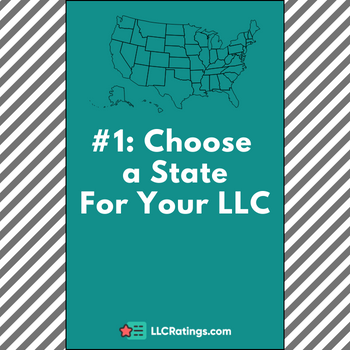
Despite that, we recommend forming a limited liability company in your state. Here are three key reasons we say this:
- You’ll have to pay home taxes in every case
- You might have to pay twice for annual filings, taxes, and registered agents
- It’s simply inconvenient
Not to mention, the definition of “doing business” varies from state to state, which puts you at a slight risk of being liable or forming two LLCs. Furthermore, you’ll have to file a foreign LLC if you want to create a limited liability company in another state.
Example
Picture this: you live in California and create an e-commerce store. After two to three months, the company starts generating six figures, so you decide it’s time to make an LLC to protect your assets.
You form an LLC and choose S-Corporation taxation in Delaware to escape getting taxed for out-of-the-state income. The problem? California considers your LLC as doing business in the state, thus forcing you to create two LLCs- double the taxes, registered agent fees, and work!
Therefore, in most cases, starting an LLC in your home state is cheaper and more convenient.
Step #2: Create a Name for Your LLC
New businesses often get stuck at this stage because they want to create the “perfect” name. Here’s what we learned…
Never overthink it!
The more time you spend scouring through the internet, brainstorming, and crossing out names, the harder it becomes. So, save yourself the headache, pick a name that makes sense and move on!
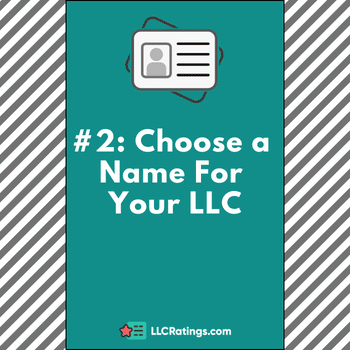
But before you get started, keep these guidelines in mind:
- Your company must have “Limited Liability Company,” “LLC,” or “L.L.C.” in its name
- Your business must avoid words that confuse your company with a government agency, like the FBI, State Department, Treasury, etc.
- You legally cannot add restricted words like Bank, University, Attorney, etc. Doing so requires additional paperwork and a licensed individuals
- Your company cannot share the same name as another business
Therefore, we recommend performing a business name search online in different states. You can use Google, social media, and the Secretary of State’s website to determine whether your proposed name is available. Remember to always check name availability before filing paperwork to avoid hurdles.
Here’s the best part: you are never stuck with your LLC name. You’ll likely only use it in legal documents, especially if you file a DBA.
Example
You form an LLC for your shampoo business and name it Bouncy Curls LLC.
As your business grows, you introduce a line of skin care products. You hire employees and expand to provide the following products:
- Organic soaps and moisturizers
- Serums and cleansers
- Hair oils and wax
But you realize that “Bouncy Curls LLC” is too narrow of a name and confuses prospects. The solution: you file a DBA requesting a different trade name.
The benefit of doing this is that DBAs don’t require you to append your LLC!
Reserve Your Business Name
You can reserve a name if you’ve already created a name for your LLC but are not registering yet. Most states provide name reservations for up to three months.
Therefore, you can register your LLC under the reserved name. Remember that you’ll have to pay the reservation fee alongside the name reservation form.
Getting a Matching Domain Name
After choosing your LLC name, we recommend getting a matching domain name, even if you don’t plan to create a business website immediately.
If not, your competitors might buy your domain and its variations to block you from using them. These “domain squatters” surf through public LLC records to register matching domains and sell them with high markups.
Therefore, waiting too long puts you at risk of having to buy your LLC name for 4x the original price. Worst of all, it might redirect you to your competitor.
Step #3: Select a Registered Agent
Registered agents act as the liaison between your LLC and the state. This business entity or third-party functions as your limited liability company’s official point of contact and will receive correspondence and service of progress to their mailing address. Moreover, Government agencies and attorneys will send them lawsuits, subpoenas, and other official documents.
Any person who’s over 18 and shares the same physical address in the state as your LLC can act as your registered agent. Third-party registered agent services also provide this service to ensure you’re always compliant, protected, and on top of your work.

In case you need a top-notch registered agent service for a great price — here’s our best Registered Agent’s guide.
Furthermore, you can appoint yourself as your LLC’s registered agent! Although that sounds like a fantastic way to save money, we highly recommend you against doing this. Why?
- Their information is public and easily accessible
- They cannot take vacations + sick days
- They can’t leave the office during business hours
Furthermore, you’ll be liable for any legal papers that don’t reach you because you weren’t at the office. It could potentially ruin your business!
For instance, if you don’t receive a complaint and consequently don’t appear in front of the court, you could get a hefty default judgment without the opportunity to defend yourself. Sounds terrible, right? That’s why we always hire a third-party registered agent service. As a result, we always received scanned documents within seconds.
Step #4: File Your Certificate of Formation (Articles of Organization)
Here’s where everything gets extremely serious!
Filing your Certificate of Formation/Articles of Organization with the Secretary of State establishes state recognition of your LLC and the details of its members.
Here are the documents you’ll have to file:
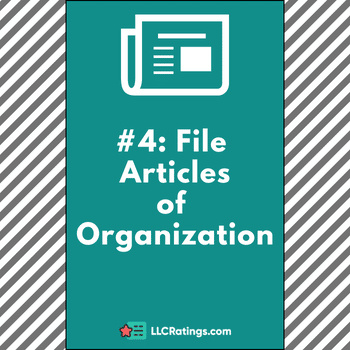
- The business address of your LLC
- The name and address of the founding members
- If members or non-members manage the LLC
- The name and address of the registered agent
- Effective date
- Duration of your LLC (if you plan to exterminate it at a particular time)
- Statement of business purpose
You can file these documents via mail or online. All files charge a filing fee, but it may vary by state. Ensure you provide error-free information to avoid unnecessary hurdles.
Formation services will file your Articles of Organization as part of their package, thus saving you time and money. We recommend working with a formation service instead of hiring a lawyer.
Step #5: Create an Operating Agreement
Although not all states require LLC Operating Agreements, we recommend you get one. This legally binding document sets the rules for how your company works internally and with the public.
Additionally, operating agreements protect the owner’s assets and outline responsibilities, voting power, ownership percentages, and a successful plan if the owner leaves.
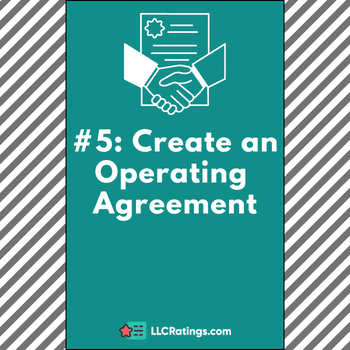
The purpose of operating agreements is to prevent miscommunication and conflicts between members. It does this in the following ways:
- It determines the individual rights and duties of LLC members
- It tells you what a non-member manager can and cannot do
- It highlights what the LLC can legally do
- It determines how new members can join your company
- It outlines how and when members receive profits
- It tells you whether members or managers are in charge
- It defines how and under what circumstances an LLC can end
- It says how you can change the rules
As we mentioned, LLC Operating Agreements are not requisitory by the Secretary of State. So, after the parties agree upon the terms and sign them, we recommend keeping the document safe and secure.
Step #6: Get Your EIN
After officially forming your limited liability company, it’s time to register it with the federal government! You’ll have to apply for an Employer Identification Number or EIN from the IRS to achieve this.
Your EIN is essential your Social Security number that allows the IRS to keep track of your business.

You can apply for a Federal Tax ID Number (your EIN) for free on the IRS website or via mail. We filed ours online and received it instantly, so we recommend you do the same.
Step #7: Register to Do Business in the Other States
If you plan to do business in multiple states, you might need to register in other states. That means you’ll have to submit paperwork similar to the one you filed when forming your LLC.
Furthermore, you’ll need a registered agent in every state you’re doing business.
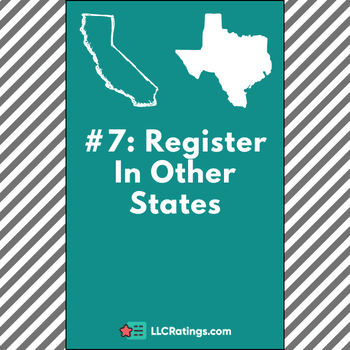
LLC vs. Other Entity Types
When forming your business, the most vital step is deciding on the ideal business structure.
Before you start setting up your LLC, consider the different business entity options available to ensure you’re making the right choice:
LLC vs. S-Corps
Although LLC and S-Corps both limit liability and offer pass-through taxation, there are innumerable differences between the two. Here’s a closer look:
- LLCs can have unlimited members, whereas S-Corps can have up to 100 shareholders
- Non-U.S. citizens can be LLC members, but S-Corps cannot have non-U.S. residents as shareholders
- Corporations, Partnerships, S-Corps, or trusts can own LLCs. However, this is not the case for S-Corps
- LLCs can have subsidiaries without any restriction; s-corporations cannot
LLC vs. Sole Proprietorships
LLCs are legal entities formed at the state level, meaning it exists separately from their members. Therefore, the LLC is responsible for debts and liabilities.
On the other hand, sole proprietorships are unincorporated businesses owned and managed by a single member. Let’s discuss their differences in depth:
- Sole proprietorships require minimal paperwork, whereas LLCs require upfront paperwork and costs
- LLC members must keep their business and personal finances separate to help preserve their liability protection. On the contrary, sole proprietorships don’t require you to create a separation between your bank and personal accounts
- Since the State considers sole proprietorships self-employed, you’ll have to list your business income and expenses on Schedule C. On the other hand, LLCs let you choose between being taxed as a sole proprietorship and a corporation
LLC vs. Partnerships
An LLC is a legal entity that mitigates its members’ liability, ensuring their assets remain protected in case of liability. Conversely, a partnership is a business agreement where people- referred to as partners- agree to go into business.
The two business structures share some similarities, like offering pass-through taxes. However, they significantly differ in the following ways:
- LLCs eliminate personal liability if your business goes into debt or sued, whereas, in a partnership, every member is held personally accountable
- LLCs can be taxed like a corporation, thus allowing them to enjoy tax benefits. On the other hand, partnerships do not have this option
A single member might choose to own and operate an LLC; however, partnerships don’t offer that flexibility. To set up a partnership, you must have at least two individuals
LLCs allow foreign individuals to act as active members, but this is not the case for partnerships
Benefits of Forming an LLC
Now that we’ve discussed how an LLC differs from other business entities let’s dig a little deeper into why an LLC is a perfect option.
Here are five advantages of structuring your business as an LLC:
- Limited Personal Liability
If your business is a partnership or sole proprietorship, you and your business are not separate. Your business debts are personal debts. And if someone accuses your business partner of negligence, your assets are also at risk.
In a limited liability company, members are not personally liable for the company’s actions. It means the LLC is responsible for its debts and obligations, and your assets- homes, cars, and bank accounts- are safe from creditors.
- Tax Advantages
Here’s the best part of forming an LLC: it doesn’t have its federal tax classification!
Therefore, the State considers an LLC a pass-through entity, meaning its profits go directly to its members without getting taxed on the business level. Instead, the owners can pay tax on the profits on their income tax returns.
As a result, LLC members don’t have to go through the hassle of filing personal and business taxes.
- Management Flexibility
Corporations entail a fixed management structure featuring a board of directors that oversees company policies. Furthermore, officers run the daily business, and the owners must elect directors and discuss business matters yearly.
On the contrary, LLCs don’t have a formal structure. Members can manage company business, thus allowing owners to play their role in day-to-day decision-making. Outsiders can also manage the business, which is helpful if members want to hire a more experienced, qualified person.
- Less Paperwork
The most significant difference between corporations and LLCs is not preventing personal liability; it’s the paperwork involved!
Corporations can limit personal liability, but that involves unique requirements, such as holding annual shareholder meetings, making annual reports, and paying annual fees. Moreover, they have to upkeep extensive records.
LLCs don’t have to hold yearly meetings or create extensive records. The best part? Most states don’t even require LLCs to file annual reports.
- Ownership Flexibility
Like LLCs, S-corporations have pass-through taxation. The downside is they can’t have over 100 owners, include foreign members, or have shareholders that aren’t corps.
In contrast, LLCs enjoy pass-through taxation without any ownership restrictions on the number or type of owners.
Cons of Opening an LLC
Before you start forming an LLC, you should also consider the drawbacks:
- Includes Self-Employment Taxes
While pass-through taxation is a fantastic advantage for LLCs, the contrary is true for self-employment taxes. Since all LLC owners are self-employed, the State subjects them to a 15.3% self-employment tax rate.
On the other hand, corporations are not considered self-employed and don’t have to worry about this tax.
- Impossible to Raise Funds through Investments
LLCs can raise capital through outside investments, but investors find corporations more appealing.
For starters, LLCs cannot issue stocks or bonds, whereas private investors can take shares of stock from a corporation. Additionally, venture capitalists avoid LLCs because the pass-through taxes are a significant disadvantage.
- Consequences of Member Turnover
In most states, we learned that if a member leaves the company, passes away, or goes bankrupt; the owners must dissolve the LLC and take care of the legal and financial obligations to terminate the business.
The members can continue doing business, which would mean starting a new LLC from scratch!
- Even “Limited” Liability Has Its Limits
Sometimes, the judge can rule that your LLC does not protect your assets. This action is known as “piercing the corporate veil” and can put your assets- car and bank accounts- at risk.
But this only happens if you fail to separate business transactions from personal ones or run the business fraudulently.
Best Professional Companies for LLC Creation
Once you’ve decided whether you want to form an LLC, you’ll probably need a proficient registered agent to receive and manage legal documents on your behalf. You’ll need someone you can trust to obtain legal documents on time and alert you promptly as well.
Here we’ve created a list of the top LLC service providers (by the way – here’s our TOP 10 services) to help you avoid the stress of obtaining and managing your business’s documents:
1. Northwest Registered
Northwest Registered Agent is among the best-registered agent services for small businesses owing to its impressive packages. The platform provides a seamless user experience, ongoing premium support, and same-day local scans.
Furthermore, Northwest Registered protects your privacy by minimizing access to your data. And the registered agent service scans non-junk mail at your address.
See our full review of Northwest here.
Pros
- Lifetime Support from Corporate Guides
- It lets you choose to pay upfront or monthly
- It helps you add more services
Cons
- Add-ons can increase the price significantly
2. ZenBusiness
ZenBusiness is another fantastic registered agent service because of its excellent customer support and value. This service shines because its LLC formation package helps protect your business and privacy for a year. The best part? It only costs $119 annually!
At the same time, if you’re only seeking registered agent services, the company provides you with a fantastic deal of $99!
Check our our full review of Zenbusiness here.
Pros
- Annual filing report alerts
- Two free changes to your filings annually
- Low-first year pricing
Cons
- High renewal fees
- Pricey add-ons
3. IncFile
IncFile is the perfect registered agent service for small businesses seeking a budget-friendly option. The platform boasts a helpful Learning Center, an interactive registered agent dashboard, and email and SMS notifications to keep you up-to-date with legal documents.
Furthermore, IncFile allows you to track and access business documents instantly. The platform also helps you file your LLC for free!
Want to know more? – read our full review of IncFile here.
Pros
- Free LLC services
- Every package includes 1-year registered agent services
- You can upgrade your package for add-ons
Cons
- Too many upsell
- Limited refunds
4. LegalZoom
LegalZoom is another incredible registered agent service with a strong foothold and easy-to-use online LLC filing services. This platform’s services include incredible features like business data protection, unlimited cloud storage, and a compliance calendar.
Although LegalZoom is more expensive than its competitors, you can rest assured they’ll provide value since they have more experience.
Pros
- Easy-to-use online LLC filing services
- Allows you to upgrade
Cons
- The basic package requires up to 20-days processing time
- Expensive upsells
5. Rocket Lawyer
Rocket Lawyer offers exceptional registered agent services to 800,000+ businesses, providing them with the legal help they need to stay secure.
We loved Rocket Lawyer because of its high-quality legal services, expert help, and professional guidance. Moreover, the platform offered registered agent services free of cost in their legal services plan for the first year.
Additionally, this registered agent service promises a 100% satisfaction guarantee, offering new businesses and entrepreneurs the help they need to succeed.
Pros
- Extensive legal services
- Strong service reputation
Cons
- Expensive
Things to Consider Before Starting an LLC in 2022
Ideally, you should consider the following four things before you set up your LLC:
How Serious Are You About Your Business?
It’s no big news: many create an LLC only to do nothing with it.
Therefore, before forming one, ask yourself, “How serious am I about this business?” If you’re not serious, there’s no need to go through the hassle and expense of forming an LLC.
If you’re ready to create your business, connect with a registered agent to get real-time guidance. But if you don’t have the time or energy to commit to a serious business, you might want to wait some time before you get started.
What’s Your Budget?
It’s no surprise that forming an LLC can be expensive.
While some states charge a nominal fee, others charge up to hundreds of dollars. Therefore, you might want to wait longer if you have a tight budget.
Will You Expand to the Different States?
LLCs might be the best fit if you’re planning to operate in one State. But a corporation might be a better option if you want to do business in multiple states.
Why? That’s because forming and operating a corporation is the same in all states. However, each State has its version of the LLC. Therefore, you might run into legal issues.
Will You Seek Outside Investments?
As we discussed, LLCs do not attract investors and venture capitalists. LLCs do not allow investors to acquire or sell a stock, giving corporations a significant advantage.
Do’s and Don’ts of Forming an LLC in 2022
If you’re new to the LLC sphere, you’re likely unaware of what the process entails. Here are several do’s and don’ts to remember when forming an LLC:
The Do’s
File All Your Documents
One missing document can ruin everything.
Ensure you compile all the documents necessary to form an LLC. You can hire a third-party registered agent or lawyer to get guidance on what you’ll have to file.
Create a Finalized Plan
Forming an LLC isn’t all that tricky, but running one successfully requires skills and dedication. Ensure you have a concrete business plan that you stick to once you create an LLC.
Select the Right Type of Corporation
Just because an LLC stands for “limited liability” doesn’t mean it is always the best. Each sort of corporation has benefits and drawbacks. S corporations, for instance, have just one level of taxation but are also limited to having no more than 100 shareholders, all of whom must be citizens of the United States. Before choosing a suitable business model for you, it’s critical to understand these factors.
Write an Operating Agreement
The operating agreement specifies each LLC member’s exact financial, legal, and management rights. It can specify who contributes capital to the business, how members leave the LLC, and how profits will be allocated. Essentially, it must include all pertinent data on the business.
Even though many states do not require an operating agreement, you still need to draft one. One should be made for LLCs with more than one member or partner to ensure everyone understands their obligations. Even one-person businesses will gain from putting the specifics in writing.
Making your operating agreement is a choice, particularly for LLCs with a single member. There are also many free templates available online to help you get started. The cost of employing an experienced attorney could be well worth it in more complicated circumstances, such as LLCs with several owners.
The Don’ts
Assume the Structure is the Same Across All States
It is crucial to realize significant regional variations in corporations’ and LLCs’ laws and regulations. The majority of small firms polled are S-corporations (42%), followed by LLCs (23%), according to the National Association of Small Business 2015 Economic Report. However, different states provide distinct tax benefits for each. Additionally, you should be aware that you are not required to register your LLC in the same state where you presently reside.
Treat It the Wrong Way
You shouldn’t think of the LLC as your bank. To prevent the LLC from turning into a single proprietorship, DO manage the LLC entirely independently from your finances as a separate and distinct organization. Avoid combining personal debts and assets with LLC assets.
Panic
Before registering an LLC or corporation, you must comprehend many crucial facts, but it is not impossible to do so; it just requires time. It is a viable option for individuals who lack the knowledge to manage it alone; many prefer to sit down with a professional and explore their options. Whatever route you choose, be aware that there are many resources out there to support your achievement.
Guarantee Debts and Obligations
If you don’t intend to be held personally liable for the LLC’s debts and obligations, avoid orally or in writing guaranteeing the LLC’s debts and obligations.
The Bottom Line
Your e-commerce business will gain financially and even psychologically by becoming an LLC. After you’ve formed your LLC, you can focus on the essential parts of running your business and steering it in the right direction.
However, creating an LLC can be challenging, especially regarding business paperwork and submitting an annual profit report. Despite the legal paperwork you will need to handle, it is a trustworthy kind of business. Make sure you examine the pros and cons before selecting whether to form an LLC or incorporate. Clients trust it, and the tax advantages will make you a ton of money.
FAQ
What is the cost of forming an LLC in 2022?
Forming an LLC typically requires between $50 and $150. The state you file in and any additional fees, such as an operating agreement or doing business, will impact the price of your LLC (DBA). State-specific filing costs for LLC creation and incorporation exist.
What LLC forms do I need to start a limited liability company?
It is necessary to draft and submit Articles of Organization, also known as a Certificate of Organization, to the state. All necessary initial franchise taxes and filing costs, as well as any other initial fees, must be paid. If you use BizFilings to create your LLC, all you need to do is fill out our short LLC paperwork, and we’ll take care of the rest. We’ll draft and submit your LLC and Articles of Organization forms.
Do I need to get an attorney to create my LLC?
No, you can create and submit your Articles of Organization, one of the most crucial LLC paperwork. Make sure you know the criteria in the state where you plan to incorporate. You may form an LLC, finish your LLC forms, and save by paying attorney fees using Northwest’s service.
Who can form an LLC?
Usually, there are neither residency nor statutory limitations on who can form an LLC. A few states, though, have laws stating that administrators and members must be at least 18 years old, or the legal age of consent.
What is the processing time to create an LLC?
It typically takes between a week and ten business days, depending on how quickly the state processes business filings. In some states, the state agency frequently grants the limited liability company approval within just three business days after receiving your intake information.
What are the benefits of filing an LLC?
Because they are frequently more economical than corporations while providing liability protection, many business owners form LLCs. For instance, personal assets are treated differently from LLC funds. They’re also typically treated as pass-through tax entities, allowing you to claim them on your taxes. The exceptions are LLCs whose owners elect to pay corporate taxes.
Do I really need a limited liability company for my business?
Because an LLC provides the same liability protection as a corporation, but with a less rigid structure and fewer administrative obligations, many small firms are set up as limited liability corporations, or LLCs.
However, not everyone requires an LLC. Some companies can succeed as single proprietorships, while others should establish corporations.
